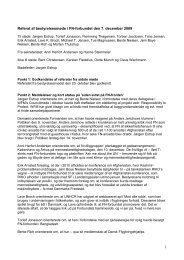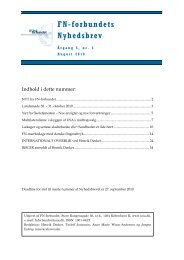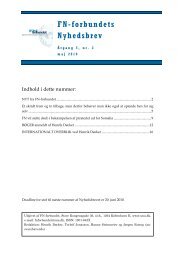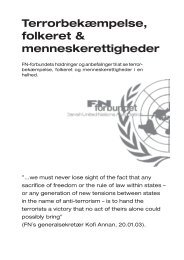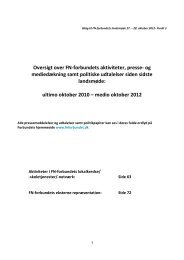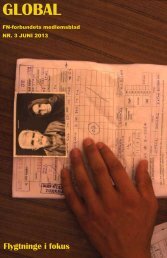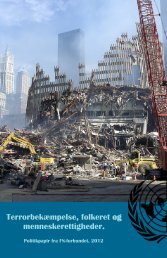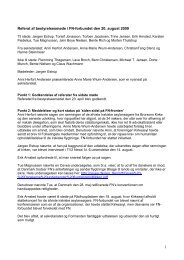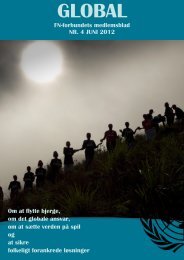Alle positionpapers - FN-forbundet
Alle positionpapers - FN-forbundet
Alle positionpapers - FN-forbundet
Create successful ePaper yourself
Turn your PDF publications into a flip-book with our unique Google optimized e-Paper software.
Russian Federation<br />
This position paper is the position of your country in the 6061 st meeting in the Security Council<br />
about the situation in Israel and Palestine. Your position is however open to change, if you feel you<br />
can agree on less strong statements in a resolution. It is however necessary to understand what<br />
other countries mean by their statements, so you are sure that the statements, you are agreeing<br />
upon, are not compromising your own. Furthermore, note that Russia is one of the five permanent<br />
members of the Security Council which gives Russia the right to use its veto on resolutions if they<br />
cannot agree upon them.<br />
It is your task to make a 1 minute opening speech based on your positions given in this paper.<br />
The final part of this document contains a speech held in the Security Council and this speech can<br />
give you an idea to how you should make your opening speech.<br />
Do this during the session: Raise a point of personal privilege while someone is giving a speech<br />
and ask them to speak up since you can’t hear what they are saying.<br />
Facts about Russia<br />
Russia is the largest country in the world and has a population of 142 million. Dmitry Medvedev<br />
has recently followed Vladimir Putin as President of Russia.<br />
Russia is part of the Quartet on the Middle East, which consist of US, Russia, EU and the United<br />
Nations which is involved in mediating the peace process in the Israeli-Palestinian conflict. The<br />
group was established in 2002 by the Spanish Prime Minister, Aznar as a result of the escalating<br />
conflict in the Middle East. Tony Blair is the current Special Envoy for the Quartet.<br />
General position<br />
Russia has a number of interests in Israel, making Israel Russia's second leading trade partner in the<br />
Middle East after Turkey. On the diplomatic front, a close relationship with Israel enables<br />
(muliggør) Russia to play, or appear (fremstå) to play, a major role in the Arab-Israeli peace<br />
process. With almost 1,000,000 Russian-speaking Jews now living in Israel, Israel has the largest<br />
Russian-speaking Diaspora (eksilgruppe) outside the former Soviet Union, and this has led to very<br />
significant ties (tilknytning) in the areas of cultural exchange and tourism. Another major interest is<br />
a military-technical one as the Russian military-industrial complex has expressed (udtrykt)<br />
increasing interest in co-producing military aircraft with Israel, especially since many of the<br />
workers in Israel's aircraft industry are former citizens (statsborger) of the Soviet Union with<br />
experience in the Soviet military-industrial complex.<br />
The issue of greatest importance to the relationship, at least from the Russian point of view, was<br />
Israeli support for Russian actions in Chechnya (Tjetjenien), with one Russian official stating that<br />
"Israel helps us break the Western information blockade of Russia over Chechnya." Israel also<br />
helped Russia by sending medical supplies to the victims of the Moscow apartment house<br />
bombings, claimed by Putin to have been perpetrated (begået) by the Chechens, and also gave<br />
medical treatment to wounded Russian soldiers.<br />
Despite Putin's shift to an even-handed (jævnbyrdig) position on the Palestinian-Israeli conflict, and<br />
Russia's important diplomatic, economic, and military ties with Israel, there are countervailing<br />
(modvirkende) pressures in Moscow preventing too close a Russian-Israeli alignment (alliance).



